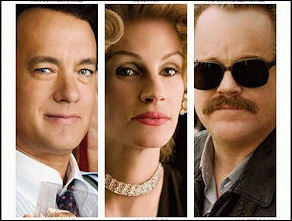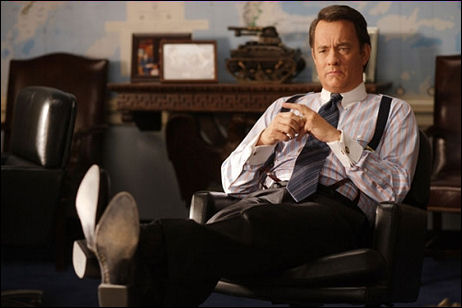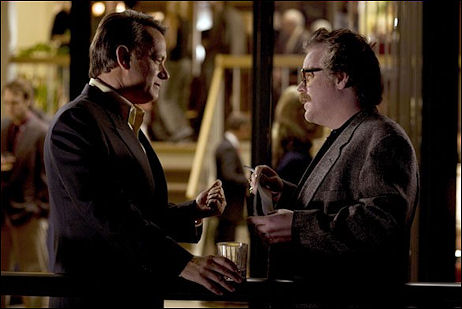After seeing Charlie Wilson’s War last Monday night I wrote that I liked it, and I meant that. I said “there is edge and attitude in this Mike Nichols film — certainly irony upon irony. And it does stay with you.” I also said that if you can “kick back, chill down and enjoy what’s awfully well-crafted and efficient about it (which isn’t hard), you’ll be fine with it too.”

But the honest fact is that I like Aaron Sorkin‘s 5.25.05 version of his Charlie Wilson’s War script somewhat more.
I don’t know how much of Sorkin’s script Nichols actually shot, but it’s been said that Nichols cut, re-cut and then re-cut some more, and then did some extra shooting. Nichols’ game plan, in any case, seems to have been to water down the explicit political references and generally play up the charm and the heroism (while toning down the irresponsible boozing) of Tom Hanks‘ Charlie Wilson character.
The final version of Charlie Wilson’s War runs 97 minutes with credits, and Sorkin’s ’05 script runs 145 pages. Based on the page content, it’s obvious that the movie has been shaped in order to be less complex, much more upbeat and explicitly depoliticized, which to say scrubbed clean of all specific Al Qeada and 9.11 mentions.
If each scene in Sorkin’s 145-page script had been shot, the film would have at least run a solid two hours, or roughly 20 to 25 minutes longer. (Nichols shot the film at a fast pace, like a comedy, so figure less than a minute a page.) The finished film tells the same basic story, but it contains only about 70% of the material that Sorkin put to page.

The script reminds you that Sorkin is a fine screenwriter and a seasoned pro — he knows how to make a script tight and fat-free and tell a good story. And I just feel that what he wrote two and a half years ago is a denser, darker and more explicit thing than the film. I’m not putting Nichols’ movie down — it’s fine for what it is. I just wish he’d used more of Sorkin’s material.
I also wish Nichols hadn’t tried so hard to make Wilson, a real-life Texas Congressman who in the late ’80s almost single-handedly arranged to supply the Afghanistan Muhjadeen with arms that led to the defeat of the Russian invaders, into such a red-white-and-blue hero.
The movie begins and ends with Hanks being given an award for his valiant efforts along these lines, and I have to say that this scene feels over-sold, as if there was a determination to make sure the audience understands that Charlie Wilson’s War is an “up” movie about a true American patriot, which it mainly is. It just seems as if this was done to make sure audiences wouldn’t interpret the film as another left-liberal downer movie about the negative effects of American intervention in the Middle East.
Nichols and the producers were, I’m sure, particularly afraid of saying too explicitly that in helping the Muhjadeen we might have helped stir the pot and sew the seeds that led to the 9.11 disaster. Too dark, muddled and accusatory — better to serve up an amiable patriotic comedy that won’t alienate the moviegoers who’ve been avoiding Middle East flicks like the plague over the last couple of months.

There’s no “congratulations, Charlie!” scene at the beginning and end of Sorkin’s script, for one thing. And while Nichols ignores it, Sorkin depicts a drunken hit-and-run accident that Wilson actually got into in Washington, D.C., right before a second visit to Afghanistan refugee camps. (In the film the trip happens in order to persuade Ned Beatty‘s white-haired U.S. Senator character, Doc Long, to vote for funding the arms shipments.)
In a briefing scene on page 107 attended by Wilson and Phillip Seymour Hoffman‘s Gust Avrakatos, a “briefer” makes an explicit reference to an anti-Soviet fighting group in Afghanistan “that we like… funded by a wealthy Saudi aristocrat. They call themselves The Base, which translates in Arabic to Al Qeada.” I’ve only seen the film once, but I don’t remember hearing this line in Nichols’ film.
And there’s a longer version of the scene between Hanks and Hoffman on the balcony when Gust reviews the possible blowback consequences of having shown a bunch of undeducated, “off-the-charts stupid” people who don’t get the New York Times delivered to their doorstep (and therefore won’t, he predicts, understand down the road that we helped them kick the Russians out of Afghanistan) how to take on a super-power.
Nichols’ film doesn’t ignore the after-effects of our Afghanistan intervention. The film says that in the end “we fucked up the end game.” It just plays down the specific 9.11 echoes.
At the very end of Sorkin’s script there’s a three-page epilogue that takes place in Charlie’s D.C. apartment on the morning of 9.11.01 — a scene absent in Nichols’ movie. We can tell that it’s several years later by Charlie looking grayer, being married and talking about being sober. He’s pouring coffee as he talks to his off-screen wife when the building is rocked by a loud boom. Charlie goes out on the balcony and sees that the Pentagon is burning. The phone rings and his wife picks up. She tells Charlie, “It’s Gust…he says to turn on the TV.”









